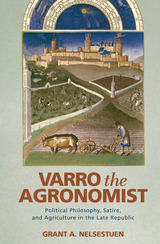
Cultivated farming advice.
Cato (M. Porcius Cato) the elder (234–149 BC) of Tusculum, statesman and soldier, was the first important writer in Latin prose. His speeches, works on jurisprudence and the art of war, his precepts to his son on various subjects, and his great historical work on Rome and Italy are lost. But we have his De Agricultura; terse, severely wise, grimly humorous, it gives rules in various aspects of a farmer’s economy, including even medical and cooking recipes, and reveals interesting details of domestic life.
Varro (M. Terentius) of Reate (116–27 BC), renowned for his vast learning, was an antiquarian, historian, philologist, student of science, agriculturist, and poet. He was a republican who was reconciled to Julius Caesar and was marked out by him to supervise an intended national library. Of Varro’s more than seventy works involving hundreds of volumes we have only one on agriculture and country affairs (Rerum Rusticarum) and part of his work on the Latin language (De Lingua Latina; LCL 333, 334), though we know much about his Satires. Each of the three books on country affairs begins with an effective mise en scene and uses dialogue. The first book deals with agriculture and farm management, the second with sheep and oxen, the third with poultry and the keeping of other animals large and small, including bees and fish ponds. There are lively interludes and a graphic background of political events.

Ancient Roman word lore.
Varro (M. Terentius), 116–27 BC, of Reate, renowned for his vast learning, was an antiquarian, historian, philologist, student of science, agriculturist, and poet. He was a republican who was reconciled to Julius Caesar and was marked out by him to supervise an intended national library.
Of Varro’s more than seventy works involving hundreds of volumes we have only his treatise On Agriculture (in LCL 283) and part of his monumental achievement De Lingua Latina (On the Latin Language), a work typical of its author’s interest not only in antiquarian matters but also in the collection of scientific facts. Originally it consisted of twenty-five books in three parts: etymology of Latin words (Books 1–7); their inflections and other changes (Books 8–13); and syntax (Books 14–25). Of the whole work survive (somewhat imperfectly) Books 5–10. These are from the section (Books 4–6) that applied etymology to words of time and place and to poetic expressions; the section (Books 7–9) on analogy as it occurs in word formation; and the section (Books 10–12) that applied analogy to word derivation. Varro’s work contains much that is of very great value to the study of the Latin language.
The Loeb Classical Library edition of On the Latin Language is in two volumes.

Ancient Roman word lore.
Varro (M. Terentius), 116–27 BC, of Reate, renowned for his vast learning, was an antiquarian, historian, philologist, student of science, agriculturist, and poet. He was a republican who was reconciled to Julius Caesar and was marked out by him to supervise an intended national library.
Of Varro’s more than seventy works involving hundreds of volumes we have only his treatise On Agriculture (in LCL 283) and part of his monumental achievement De Lingua Latina (On the Latin Language), a work typical of its author’s interest not only in antiquarian matters but also in the collection of scientific facts. Originally it consisted of twenty-five books in three parts: etymology of Latin words (Books 1–7); their inflections and other changes (Books 8–13); and syntax (Books 14–25). Of the whole work survive (somewhat imperfectly) Books 5–10. These are from the section (Books 4–6) that applied etymology to words of time and place and to poetic expressions; the section (Books 7–9) on analogy as it occurs in word formation; and the section (Books 10–12) that applied analogy to word derivation. Varro’s work contains much that is of very great value to the study of the Latin language.
The Loeb Classical Library edition of On the Latin Language is in two volumes.

On one level, Varro’s treatise presents an innovative account of the Roman farm, which rationalizes new agricultural and pastoral opportunities for contemporary elite owners of large-scale estates. But on another level, this bold agronomical vision associates the farm’s different spheres with distinct areas under Roman control, thereby allegorizing Rome’s empire on the model of a farm. Nelsestuen argues that Varro’s treatise thus provides his contemporaries with a model for governing the Roman state, anticipates Augustus’ subsequent transformation of Roman dominion into a coherent territorial state, and offers an ancient theory of imperialism.
Shedding new light on the only completely extant work of a much-celebrated but ill-understood figure, Varro the Agronomist has much to offer to those interested in Latin literature—especially, Cicero and Vergil—as well as on the political dimensions of intellectual life in first-century bce Rome, ancient imperialism, and Roman political philosophy.
READERS
Browse our collection.
PUBLISHERS
See BiblioVault's publisher services.
STUDENT SERVICES
Files for college accessibility offices.
UChicago Accessibility Resources
home | accessibility | search | about | contact us
BiblioVault ® 2001 - 2024
The University of Chicago Press









